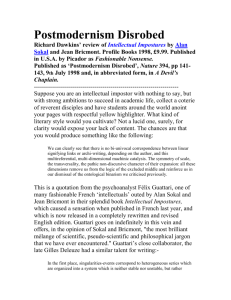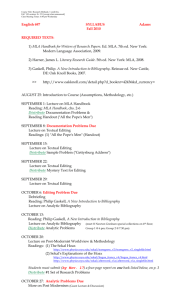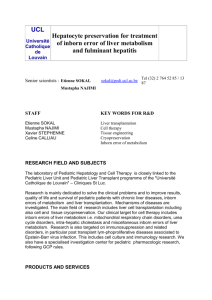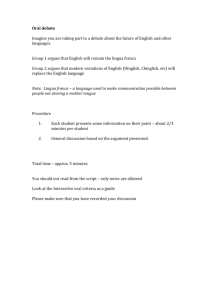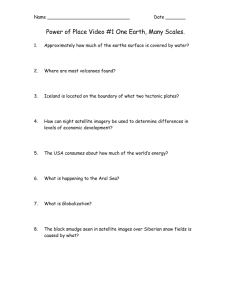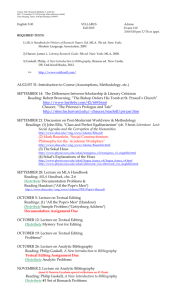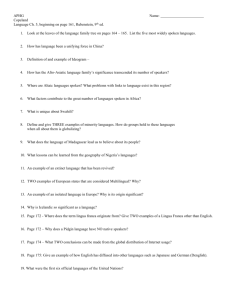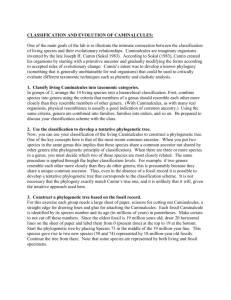and although statements like, "" (), raised my
advertisement
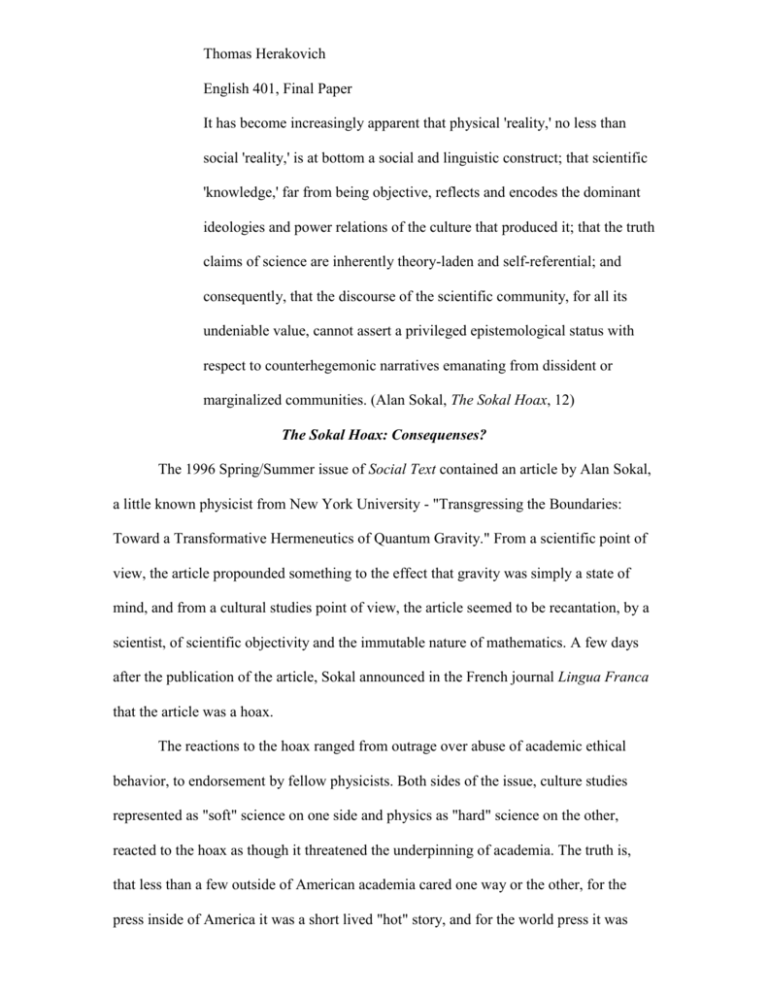
Thomas Herakovich English 401, Final Paper It has become increasingly apparent that physical 'reality,' no less than social 'reality,' is at bottom a social and linguistic construct; that scientific 'knowledge,' far from being objective, reflects and encodes the dominant ideologies and power relations of the culture that produced it; that the truth claims of science are inherently theory-laden and self-referential; and consequently, that the discourse of the scientific community, for all its undeniable value, cannot assert a privileged epistemological status with respect to counterhegemonic narratives emanating from dissident or marginalized communities. (Alan Sokal, The Sokal Hoax, 12) The Sokal Hoax: Consequenses? The 1996 Spring/Summer issue of Social Text contained an article by Alan Sokal, a little known physicist from New York University - "Transgressing the Boundaries: Toward a Transformative Hermeneutics of Quantum Gravity." From a scientific point of view, the article propounded something to the effect that gravity was simply a state of mind, and from a cultural studies point of view, the article seemed to be recantation, by a scientist, of scientific objectivity and the immutable nature of mathematics. A few days after the publication of the article, Sokal announced in the French journal Lingua Franca that the article was a hoax. The reactions to the hoax ranged from outrage over abuse of academic ethical behavior, to endorsement by fellow physicists. Both sides of the issue, culture studies represented as "soft" science on one side and physics as "hard" science on the other, reacted to the hoax as though it threatened the underpinning of academia. The truth is, that less than a few outside of American academia cared one way or the other, for the press inside of America it was a short lived "hot" story, and for the world press it was simply a small blip on the radar screen. In order to lend credibility to his scheme, Sokal publicly related to Social Text as "a leading North American journal" ("A Physicist…," 50), while the editors of the journal referred to themselves as a 'little magazine' (Robbins and Ross, 55). The press in America tried their best to pound it into a story, with large news papers like the New York Times, The Washington Post, and The Los Angeles Times, running multiple articles, essays, and rebuttals. And if there was damage, albeit short lived, it was not to the whole of academia, but rather to the intellectual left. Peter Osborne, a professor of Philosophy, complained that "Sokal has also provided the press with an ideal occasion to prosecute two of its favorite pastimes - disparaging intellectualism, of any kind, and travestying the left - while bolstering the sagging image of the 'scientist' as a figure of authority and a man of reason and good sense" (Osborne, 197). As an ironic aside, it is notable that in 1994, in his article "The Scholar in Society," Gerald Graff wrote these lines: It is true that since academics rarely have direct access to the mass media, they are vulnerable to being caricatured there. But it is also true that the caricatures of the academy nourish when academics fail to explain themselves in terms the public can understand. As long as academic humanists are unable or unwilling to make their debates accessible in the public sphere, it will continue to be their detractors who speak for them. (355) Although Graff's missive brings much to the table by way of academic debate, at least in this instance, the Sokal affair proved Graff to be prophetic. And, whether Sokal chose to polarize the academic community - right and left - humanities and science - he nonetheless accomplished that feat; reading through the various articles, essays, and newspaper pieces, one is immediately struck by the polemic nature of the writing, and it becomes all to clear that there is very little middle ground from which to assess the material. On the surface, it would seem that Sokal simply wanted to point out "a particular kind of nonsense and sloppy thinking: one that denies the existence of objective realities" ("A Physicist…," 51). These charges of "nonsense and sloppy thinking" were not being leveled at his brothers in the "hard" sciences, but rather at what he seemed to believe was the heart of the humanities - the left wing of cultural studies. The charge by Sokal that those involved in the studies of culture, whether right, left, or center, deny the existence of objective reality, of a "real world" ("A Physicist…," 51), is debunked by academics in the humanities writing in defense of the discipline. Interestingly, this accusation of disbelief in a real world finds its way into much of the writing by Sokal's fellow physicists, but is always introduced as a sort of "common knowledge," an indisputable fact that, unlike other specific accusations, is aimed at some euphemistic postmodern shade - a sort of humanistic "caricature" (Terry, 100). This idea of a "caricature," a possible common knowledge sent me looking for a source text - a sort of "Q Gospel" (13). Higher Superstition, authored by Paul Gross and Norman Levitt, "a biologist and a mathematician who shared [Sokal's] disdain for critiques of science done in the name of postmodernism, cultural studies, and science studies" (Sokal Hoax, 1), was mentioned not only by the editors of The Sokal Hoax (1); but also by Bruce Robbins and Andrew Ross, editors of Social Text (Robbins and Ross, 57). Further investigation reveals it be a source text (Q Text) for rash generalities and unabashed attacks by Gross and Levitt on the "caricatures" of leftist postmodernism, feminism, cultural studies, and deconstructionism, all grouped conveniently under the umbrella of the "academic left" (Gross and Levitt, 2). Higher Superstion as a Q Text seems to be not only the origins of the "postmodernist" generalities that plague Sokal's work, but also the complaint about Derrida and the "Newtonian Constant" that has trickled down from Gross and Levitt to Sokal and hence into the writings of other scientists commenting on Sokal's hoax (Gross and Levitt, 79) (Sokal, 16) (Weinberg, 149, 170). At the least, it seems interesting that Gross, Levitt, Sokal and the rest have found, out of the prodigious amount of Derridian text, only one thing to complain about - evidently leaving the field of "hard" sciences at the lowest end of any department in the university! There is little good to recommend Higher Superstition; the supposed centrist position of the authors evaporates as the text quickly degenerates into blatantly racist and anti-feminist doctrine. Robbins and Ross write in their defense of Social Text, "Like Gross and Levitt, [Sokal] appears to have absorbed these critiques only at the level of caricatures and has been reissuing these caricatures in the form of otherworldly fanatics who deny the existence of facts, objective realities, and gravitational forces" (57). And it would seem upon further investigation that, even Gross and Levitt's presumption of their place as centrist disconcerned watchdogs attacking a group of anti-science leftist vagabonds is skewed. Ron Strickland, a professor of English Studies, writes that "they are setting up a centrist-conservative discourse, calling it liberal, and then citing it as an example of how liberals are sloppy scholars" (Strickland). While managing to avoid the obviously bigoted tenor of Higher Superstition, and under the guise of his own self-proclaimed leftist position, Sokal unfortunately iterates much of the same doctrine. In his initial Lingua Franca essay, "A Physicist Experiments with Cultural Studies," exposing his hoax, Sokal complains that Social Text is an nonrefereed journal, and that if they had doubts about his article they should in fact have sent it off to a physicist for further exploration. This seems to beg the question as to why he picked a non-refereed journal, planning from the beginning to slam them for doing and being exactly what they are? On the other, he complains that even if the editors of the journal couldn't make heads or tails of the physics, they should at least have been able tell from the first few paragraphs that the article was so problematic that it should not be published. The first paragraph of his hoax essay seems to get the most attention: There are many natural scientists, and especially physicists, who continue to reject the notion that the disciplines concerned with social and cultural criticism can have anything to contribute, except perhaps peripherally, to their research. Still less are they receptive to the idea that the very foundations of their worldview must be revised or rebuilt in the light of such criticism. Rather, they cling to the dogma imposed by the long postenlightenment hegemony over the Western intellectual outlook, which can be summarized briefly as follows: that there exists an external world, whose properties are independent of any individual human being and indeed of humanity as a whole; that these properties are encoded in "eternal physical" laws; and that human beings can obtain reliable, albeit imperfect and tentative, knowledge of these laws by hewing to the "objective" procedures and epistemological strictures prescribed by the (so called) scientific method. ("Transgressing…," 11) It would appear that the editors of Social Text were allured by the possibility that a "'real' working scientist" had finally seen the light and had written a cultural critique of science (Berube, 144). As mentioned earlier, much of the ensuing debate centered on the interpretation of Sokal's allusion an objective "external world," a "real world," and the acceptance of it by hard science and his assertion that those in cultural studies believe otherwise. In the words of Michael Berube, "…you [Sokal] purchased your authority to speak partly by being a scientist" (141). Personally, outside of the issue of an obscuranist jargon laden text, I don't find it odd that the editors of a non-refereed cultural studies journal gave Sokal's piece its day in print. As a society and a culture, we tend to put science and the scientist on a pedestal. We most often defer to the scientist. And it is in this light that I perceive Sokal as having overstepped an ethical boundary. In his expose', Sokal explains his first paragraph, feeling as though attack on the objectivity of science were enough to alert the careful reader of the problems to come. But I must disagree even with his evaluation of his own writing. As a careful reader, Sokal's seeming challenge to a quantifiable "real world," raised my suspicions, and challenged my slippery foothold in what was known to my generation as "earth science," I nonetheless found myself surrendering, to the mystique of the physicist, offering a sort of special dispensation to Sokal as an expert in a field of study that was, and continues to be, beyond my personal comprehension. Sokal, it seems, wants it both ways - he wants to be thought of as "objective" and yet he wants us to understand that truth is not incontrovertible, and he is not alone. In his essay in The Sokal Hoax, Steven Weinberg, physic's professor at the University of Texas at Austin makes it abundantly clear that he would keep the scientific high ground free of the layman's misunderstandings and possible abstractions: Those who seek extrascientific messages in what they think they understand about modern physics are digging dry wells. In my view, with two large exceptions, the results of research in physics (as opposed, say, to psychology) have no legitimate implications whatever for culture or politics or philosophy. (152) I find this attitude to be the act of digging trenches for turf wars - the sacred knowledge that can be held and understood only by the elect - in this case the scientist. Weinberg, like Gross, Levitt, and the press at large, seem ready to abstract the publication of Sokal's hoax in a small non-refereed journal into an academic collapse affecting the entirety of the humanities. Weinberg writes, "Such errors suggest a problem not just in the editing practices of Social Text, but in the standards of a larger intellectual community" (Weinberg, 151). In his article, Weinberg attacks, among others, Social Text editor Andrew Ross, and his efforts to discredit Ross bring up two interesting points. The first being that a few pages later, Norton Wise, professor of History of Science at Princeton University, guts Weinberg's arguments (Wise, 163-6), causing the reader to wonder just how much, like Weinberg, Sokal, Gross, and Levitt have tipped the scale in their favor by writing to an audience that doesn't understand their language or history? Wise also raises the question of Weinberg's own "cultural agenda in his attempt to rewrite history" (Wise, 166). The other point, and perhaps the more far reaching of the two, is that even in the field of science, including physics, there exists the archetype of the humanities based non-refereed "tendency journals" - "hypothesis journals" (Lloyd, 265). "The hypothesis journals… serve as the cutting edge for ideas… that's why hypothesis journals exist in all the sciences and in medicine…" (Lloyd, 265). I find it interesting that Social Text has been abused consistently by Sokal et al. for editorial practices that are legitimate within its definition as a non-refereed journal, while the existence of the similar hypothesis journal was never mentioned. Out of the questions raised by Social Text's editorial decision grows the debate about multidiscipline work. And the debate points up many of the problems that occur when we try to communicate across disciplinary boundaries. Much has been made of the "obscuranist language propagated by the French Intellectual movement (and almost without missing a beat - Derrida). Did Derrida and the French Intellectuals throw a wrench into the language of theoretical works? Yes, undoubtedly. The language they invented, their disdain for history, their forays into other fields including psychology and philosophy, and their subsequent twisting of metaphysics turned Humanities departments upside down. And yet in a Marcusian sense it took something that drastic to open the academy to a new paradigm, to construct a "refusal." John Bender in his essay "Eighteenth-Century Studies," relates the necessity for change that preceded the endorsement and acceptance of the French Intellectual movement in American academics: Until recent revisions of critical method by feminism, new historicism, and cultural materialism, Anglo-American investigation of eighteenth-century literature proceeded largely within deep-rooted postulates - within a frame of reference - that fundamentally reproduced enlightenment assumptions themselves and therefore yielded recapitulation rather than the knowledge produced by critical analysis. (79) It was a drastic pendulum swing, but as many of the critics of Sokal, Gross, and Levitt note, it has since swung back toward the middle - thick deconstructionist text is rapidly disappearing. Robbins and Ross comment on Sokal's choice of language and theory is telling: Like other journals of our vintage that try to keep abreast of cultural studies, it has been many years since Social Text published direct contributions to the debate about postmodern theory, and his article would have been regarded as somewhat outdated if it had come from a humanist or as a social scientist. (Robbins and Ross, 55) To a large extent these early arguments have been well hashed through in the press and other journals, and are a means to wander from a deeper problem that arises from the writing of Sokal, Weinberg, Gross, and Levitt - the point that there seems to be a complete misunderstanding by physicists of writing in the humanities - they just cannot seem to read outside their discipline. And while I think all could agree that there is an inherent need for a specialized knowledge and understanding of the language and terminology's of a science in order to investigate and understand concepts organized and explored in those scientific fields, it seems odd to me that Sokal et al. have not only criticized the professional language of the postmodernist as obscuranist - while failing to mention the ever widening gap that separates hard science not only from the understanding of the layman but also other academic fields outside of the "hard" sciences. Sokal writes, "But I am a mere physicist: if I find myself unable to make heads or tails of jouissance and differance, perhaps that just reflects my own inadequacy" ("A Physicist…," 49). And that really is a central problem. After reading Sokal's various responses and rebuttals written about his hoax, one is forced to ask whether or not he is capable of reading abstract literary theory? In Sokal's "A Plea for Reason, Evidence, and Logic," he manages in a few short pages to aver that science should not be held accountable in any way for delivering objective observations to the nonscientific world, presented as fact and gleaned from the use of scientific knowledge that turn out to be untrue, he again proves his inability to interpret or hold in context, writing outside of his own discipline, and implicates the academic left as a threat to our democratic lifestyle. Sokal quotes Robbins as having written that "It was not long ago that scientists gave their full authority to explanations of why women and African Americans were inherently inferior" (252). And reacts to Robbins' interpretation that "truth can be another source of oppression" (252), by writing: Sure, lots of people say things about women and African Americans that are not true; and yes those falsehoods have sometimes been asserted in the name of 'science,' 'reason' and all the rest. But claiming something doesn't make it true, and the fact that people - including scientists - sometimes make false claims doesn't mean that we should reject or revise the concept of truth. Quite the contrary: it means that we should examine with the utmost care the evidence underlying people's truth claims, and we should reject assertions that in our best rational judgement are false. (252) I for one, find it interesting that Sokal dissertates on the nature of truth while attempting to negate Robbins' simple assertion that what science once presented as truth was used as a means of oppression, and that in calling for the use of empirical evidence for evincing this truth, he then calls on us to interpret the information with our "best rational judgement." As if that sort of interpretive failure were not enough, Sokal then takes on the world of the Zuni Indians through the writing of archeologist Roger Anyon. In attempting to explain the religious beliefs of the Zuni Indians, Anyon writes, "that science is just one of many ways of knowing the world…. [The Zuni's worldview is] just as valid as the archeological viewpoint of what prehistory is about" (251). Sokal, throwing any last vestiges of wisdom freely to the wind, responds by writing: We have here two mutually incompatible theories. They can't both be right; they can't both even be approximately right… It seems to me that Anyon has quite simply allowed his political and cultural sympathies to cloud his reasoning. And there's no justification for that: We perfectly well remember the victims of horrible genocide, and support their descendents' valid political goals, without endorsing uncritically (or hypocritically) their societies' traditional creation myths. More over, the relativist's stance is extremely condescending: it treats a complex society as a monolith, obscures the conflicts within it, and takes its most obscuranist factions as spokespeople for the whole. (251) I'm affriad Sokal's comments speak for themselves; although it might bear mention that in the previous paragraph he intimates that science should be allowed ownership of ancient Zuni tribal remains - I suppose that's how he purports to "support their descendents." All of this brings us back to the concept of a Q Text. Sokal, Weinberg, Gross, and Levitt would have us believe that there is a "crisis" in academia, that the crisis is being perpetrated by left wing cultural studies professors, and these professors and their disdain for the objectivity and imperical methods of the hard sciences could cause not only the downfall of academia but could also be responsible for the overthrow of society as we know it today. And at the risk of creating a caricature of the western scientist, it does seem that at least these four "scientists" are unable to extricate themselves from the empiricism of western science - the closed box of black and white thinking, and consequently, they are unable to torque their minds in such a way as to grasp the concept that the problem being discussed lies in the very definitions that they attempt to elaborate, in the very logic of their arguments. Hence, when unable to grasp a concept that lies outside of their box they, in keeping with their complaint about the academic left and its apparent failing regarding multidisciplinary thinking and writing, offer up opinions that are less than enlightening or even entertaining. One is forced by the evidence of Sokal, Weinberg, Gross, and Levitt's own writing as to question their motives - to question whether or not the root of their complaints stem from a conservative 'hard science" agenda or whether their seeming propensity for misrepresentation stems from an almost complete misunderstanding of reading and writing outside of their own discipline? Using Gross and Levitt's work as a spring board and as a template, Sokal set to work on a slippery foundation, and his hoax it would seem had little to do with the reality of the task he had set himself. And yet, while hopefuly short lived, the consequences have been wide ranging. Certainly the mistrust and misunderstanding that has long separated the hard and soft sciences have grown worse - the gap widened not shortened by the hoax. The American press was also given fuel for the fire of propagating the myth of the "academic ivory tower." On the other hand, it seems like "much ado about nothing." There are only a handful of pointed scientific mistakes that are cited in Higher Superstitions (and after Wise's having taken Weinberg to task, one is forced to question even the validity of these). If there are authors that are guilty of sloppy scholarship, shame upon them, but the facts seem to point to minimal real error, and to a possible handful of authors as having made them, and further, that these authors are certainly not representative of the whole of the humanities. The real problem seems to be differences of philosophy. Consequently, after wading through Gross and Levitt's brash racist and gender intolerant ideology, and noting little other than self-serving innuendo and generalities about the academic left, postmodernism, and the enormity of the problems growing out of their doctrines, and after reading numerous articles by Sokal in defense of his hoax, I was left wondering - where's the beef? I expected a scientific approach to the supposed problems, text laden with examples and dates and references to back up the now exposed attack on a scientific "Motherhood and Apple Pie" ("A Plea," 250). It never materialized. What Sokal et al., have really opened up is not so much a specialized language problem, or obscuranism, or left wing postmodernist plots on the American way, but rather the collapse of the boundaries that inhibited multidisciplinary studies. Perhaps at a time when multidisciplinary work is at its most prevalent, we should instead be concentrating on setting the ground rules for multidisciplinary tasks and the possible necessity of the collaborative nature of successful work that originates in the intention to transcend disciplinary boundaries. In the end, it is Social Text editor Andrew Ross, that furnishes a moment of clarity, "While I do not think the Sokal affair proved anything (it was an anomaly in almost every respect), it did expose a landscape of resentments and suspicions that may have to be negotiated" (Ross, 248). Works Cited Bender, John. "Eighteenth-Century Studies." Redrawing the Boundaries. Eds. Stephen Greenblatt and Giles Gunn. New York: MLA. 1992. Berube, Michael, and Alan Sokal. "The Sokal Hoax." The Editors of Lingua Franca. The Sokal Hoax. USA: University of Nebraska Press, 2000. 139-47. Graff, Gerald. "The Scholar in Society." Introduction to Scholarship in Modern Languages and Literatures. Ed. Gibaldi, Joseph. New York: MLA, 1992. Gross, Paul, and Andrew Levitt. Higher Superstition. Baltimore, MA: The Johns Hopkins University Press, 1994. Lloyd, Elizabeth. "Lingua Franca Roundtable." The Editors of Lingua Franca. The Sokal Hoax. USA: University of Nebraska Press, 2000. 253-66. Osborne, Peter. "Friendly Fire: The Hoaking of Social Text." The Sokal Hoax. Editors of Lingua Franca. USA: University of Nebraska Press, 2000. 195-99. "Q Gospel." Funk, Robert W. et al., eds. The Five Gospels: The Search for the Authentic Words of Jesus. New York: Macmillan Publishing Company, 1993. Robbins, Bruce, and Andrew Ross. "Response: Mystery Science Theater." The Editors of Lingua Franca. The Sokal Hoax. USA: University of Nebraska Press, 2000. 54-8. Ross, Andrew. "Reflections on the Sokal Affair: Forum at New York University." The Editors of Lingua Franca. The Sokal Hoax. USA: University of Nebraska Press, 2000. 245-48. Sokal, Alan. "A Physicist Experiments with Cultural Studies." The Editors of Lingua Franca. The Sokal Hoax. USA: University of Nebraska Press, 2000. 49-53. ---. "A Plea for Reason, Evidence, and Logic." The Editors of Lingua Franca. The Sokal Hoax. USA: University of Nebraska Press, 2000. 249-52. ---. "Transgressing the Boundaries: Toward a Transformative Hermanutics of Quantum Gravity." The Sokal Hoax. Editors of Lingua Franca. USA: University of Nebraska Press, 2000. 11-48. Strickland, Ronald. "Re: Higher Superstition." E-mail to the author. 22 Oct. 2002. The Sokal Hoax. Editors of Lingua Franca. USA: University of Nebraska Press, 2000. Terry, James. "Another Dispatch fro the Culture wars." The Sokal Hoax. Editors of Lingua Franca. USA: University of Nebraska Press, 2000.101-103. Weinberg, Steven. "Sokal's Hoax and Selected Responses." The Editors of Lingua Franca. The Sokal Hoax. USA: University of Nebraska Press, 2000. 148-71. Wise, Norton M. "Sokal's Hoax and Selected Responses." The Editors of Lingua Franca. The Sokal Hoax. USA: University of Nebraska Press, 2000.163-66.
